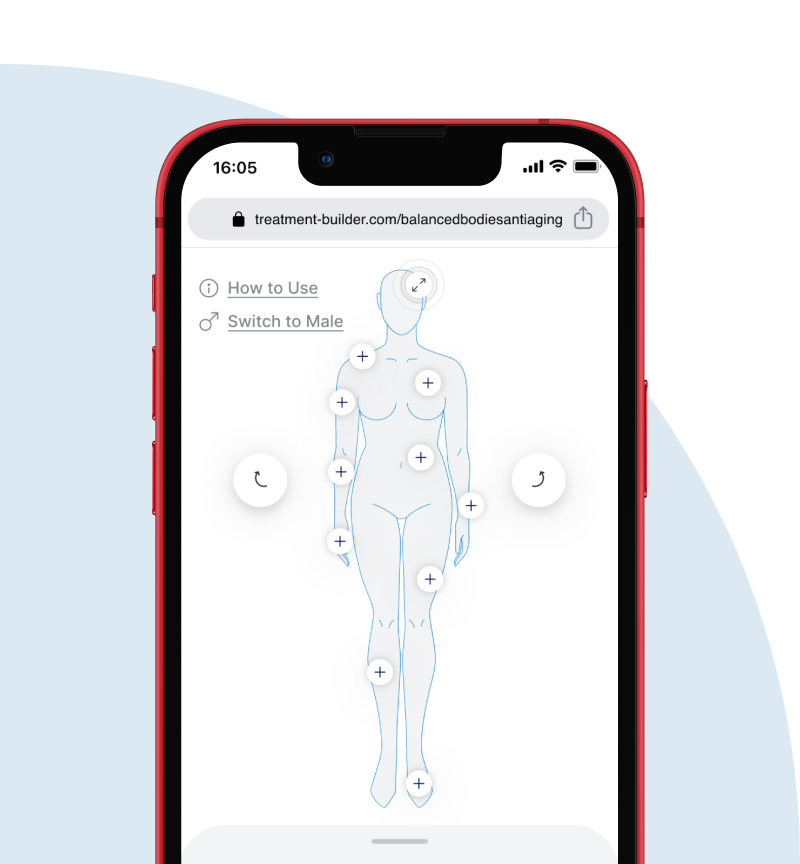
Life with allergies can be tricky, uncomfortable, and inconvenient. It’s even harder when you don’t know exactly what’s triggering the allergies, or whether it’s food or environmentally related. At Balanced Bodies Anti-Aging Clinic in Sandy Springs and Lawrenceville, GA, we provide food allergy testing to help our clients regain some comfort and control in their life. In this article, we’ll walk you through the process and what you need to know about it.
How Does Food Allergy Testing Work?
The Skin Prick Test
There are several common ways to handle food allergy testing, all of which have their different benefits. Skin testing is the most common form of allergy testing, since it allows for multiple allergens to be tested at once. This makes it convenient and time-effective.
When it comes time to narrow down your potential food allergies, one of the options is to use a skin prick test. This can be done on your back or forearm, depending on how much room is needed. It tends to give quick feedback on what your allergens may be.
Checking the Body’s Reaction Capabilities
Either glycerin or histamine and saline may be used to check your skin’s ability to appropriately react. Saline and glycerin typically don’t cause a skin reaction, but histamine usually does.
What To Expect
First, the skin of either your back or forearm will be cleaned off to ensure it’s sterile so you’re kept safe, and your results are kept accurate. Drops of different allergen extracts can then be placed next to identifying marks on your skin. The allergen extract will be introduced into your skin by lightly pricking the skin with a tiny needle. How the skin around this allergen reacts helps determine what your body is allergic to.
How Long Does It Take?
A big aspect of this test’s popularity is its speed. If the skin is going to react, it usually will do so within 15 minutes, although it may take just a bit longer depending on individual factors.
What Happens After the Test?
Once you have your allergy results back, we can give you advice when it comes to diet or life changes that can help you cope with your allergies. You can ask us any questions you have about your results.
For instance, some people who come up sensitive to a food, but have eaten the food before with no obvious ill effects, may wonder if it’s safe to eat that food in small amounts, or if it’s better to avoid the food altogether. We’d be happy to give you our input on the situation.
Moving Forward
By putting our brains together, we can guide you to the proper resources and help you plan out how to live your healthiest life. If there’s a certain food that we believe could be dangerous to your health, we would strongly recommend you avoid it, and may suggest an epi-pen to keep you as safe as possible.
Comparing Other Testing Methods
Skin Injection Test
If you come up negative to the skin prick test but still believe there’s a specific allergy at play here, getting individually tested for this allergy with a skin injection test may be an option for you.
Since the injection is introduced deeper into your skin than the prick test, it should give a fairly definitive result, even if your body’s reactions are harder to read. As with the previous test, it will take about 15 minutes for your results to be noted.
The Patch Test
This test involves the client wearing allergen-containing patches for two days before returning to have the patches removed and any results identified.
What About Blood Tests?
Blood tests involve a blood draw, where your blood itself will be tested for specific IgE antibodies floating around in your system. After a blood draw, the person being tested will be able to go home and wait for their results, which will usually come back in just a few days.
What Causes Allergies?
The Body’s Immune Response
Why is it that some people tolerate a certain substance, when others don’t? It boils down to how our individual bodies react to certain items. Allergies happen when the body mistakenly identifies a harmless substance as a dangerous one. The body, believing it’s under attack, produces antibodies to fight this “invader.” Immunoglobulin E, also known as IgE, is one of those antibodies.
IgE is behind a lot of the symptoms we suffer when we’re dealing with seasonal allergies, including sneezing, coughing, weepy eyes, and itching. However, food allergies can cause a more intense reaction, ranging from mild stomach pain and bloating, to swelling or anaphylaxis. That’s one reason food allergies have to be taken so seriously.
Why Get Tested for Food Allergies?
Many people who’ve been dealing with allergies for a while eventually get to the point of identifying their irritants. Trial and error may eventually bring you some answers, but it’s hardly comprehensive and far from pleasant. Other folks find themselves in a cycle of trying to eliminate certain foods or environmental irritants, and not seeing any lasting improvement for their symptoms. If you find yourself in this position, food allergy testing might be the right call for you.
Rather than trying to figure it out on your own, which could potentially be harmful to your health, getting properly tested can be the first step in getting your allergies treated effectively. That’s where our office can help. Rather than laboriously trying to identify all of your allergens on your own, you can get tested for many possible allergens at the same time.
What Can We Test For?
Our test panel includes the most common consumable allergens, a whopping 96 of them! Some of these common allergens include:
- Corn
- Eggs
- Fish
- Fruits and vegetables
- Grains and legumes
- Lectin
- Dairy
- Nightshades
- Tree nuts and peanuts
- Shellfish
- Soy
- Wheat
Food allergy symptoms can be mild and irritating, or life-threatening. No matter what your symptoms are, we want to help you find the answers you need.
What Are False Negatives?
False negatives are when you have an allergy, but your body doesn’t react to the test. This may happen if you’re on allergy medicine during the time of your testing, so if you’re using over-the-counter medicine to fight your unidentified allergy, our team may ask you to stop taking it for a few days before you’re tested.
If for whatever reason, you can’t stop taking your allergy medicine, we can go over your options with you.
Allergy FAQs
1. Is It Allergies, or Do I Get a Lot of Colds?
Food and environmental allergies can have some similar symptoms to a cold or “bug”. One thing we like to point out is if your eyes are itching, it’s more likely to be caused by allergies than a cold, although this isn’t definite.
Allergies will last for as long as you’re exposed to an allergen, and symptoms can linger for a while after the allergen has been removed. On the other hand, colds usually have a time limit of a week to 10 days. In the end, the only way to know for sure if you have an allergy is to get tested for it.
2. Can Allergies Be Cured?
Usually, the answer is no, although there are some cases where if a person is just mildly sensitive to something, more exposure may help them be less sensitive. This can depend on what you’re actually allergic to, and we don’t recommend attempting this on your own, especially with food allergies. Having a professional on your side can help you find the most effective and safest way to deal with your symptoms.
While you may not be able to find a “cure” for your allergies, you can definitely make changes to keep yourself more comfortable. This may look like cutting certain foods out of your diet or making some environmental changes. Kids can sometimes outgrow allergies altogether.
3. Are My Skin Issues Caused by Allergies?
If you’re suffering from a mystery skin issue that the dermatologist hasn’t been able to address, getting allergy tested can help you rule out possible causes. Allergies can cause hives, which usually look like red welts or itchy, swollen patches of skin. The reaction can be mild or severe and may be worsened by stress or scratching.
If allergies really are the culprit behind your skin issues, knowing what your allergens are and how to manage your symptoms can help the hives resolve.
Additional Ways You Can Support Your Body
Micronutrient Testing: The Ultimate Check-Up on How Your Body Is Processing Nutrients
If you want to make sure your body’s on the right track, taking a look at your micronutrient status can be an important step. This can be especially true if you’re dealing with a complicated chronic condition with an unknown underlying cause.
Our team is able to measure extra and intracellular level deficiencies, making this kind of micronutrient testing the most comprehensive form of nutritional analysis currently available. We all know the importance of fueling our body with good food, but how can you tell whether or not your body is utilizing these nutrients? This test takes a look at how the body is handling antioxidants, metabolites, over 30 vitamins, amino and fatty acids, and numerous minerals.
Nutrients Are the Powerhouse of the Body
All of these micronutrients empower the body to produce crucial hormones, enzymes, and other substances you need to be in good health. They’re also essential for proper growth and development.
This test gives a clear short and long-term picture of your nutrient status, which includes the last four through six months. This insight into your body will give you the information you need about whether nutritional replacement may benefit you. If so, these test results enable you to personalize your supplements to your exact needs, and our team would be happy to help you decide on the right supplements for you.
Nutrient Replacement Therapy
Some of the nutrient replacement therapy we offer here includes vitamin booster injections, as well as oral supplementation and IV therapy. We believe that the nutrients in our body make the foundation our health is built upon, and each micronutrient plays a huge role in keeping our cells functioning as they should be.
Processes such as developmental and metabolic functions all need micronutrients to work properly, so it makes sense that certain deficiencies may contribute to a range of illnesses and health concerns.
Our Team Is Ready To Help
If you’re interested in food allergy testing, or want different ways to support the overall health of your body, our team is ready to help. Reach out to us at Balanced Bodies Anti-Aging Clinic in Sandy Springs or Lawrenceville, GA, to set up your appointment!


